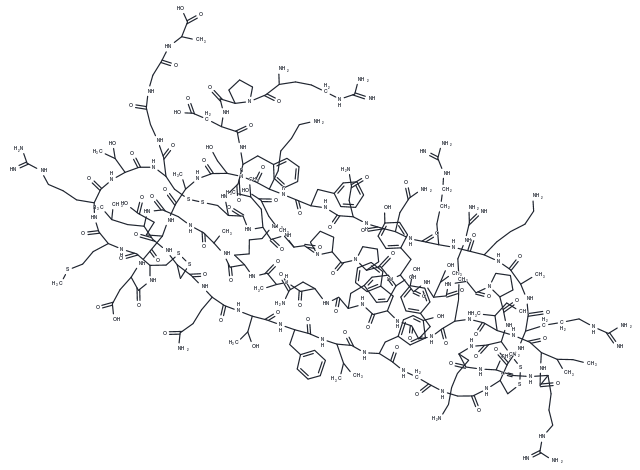keep away from moisture | Powder: -20°C for 3 years | In solvent: -80°C for 1 year
Aprotinin (Traskolan) 是分离自牛肺的一种广谱丝氨酸蛋白酶抑制剂,可抑制多种不同酯酶和蛋白酶的活性。

| 规格 | 价格/CNY | 货期 | 数量 | |
|---|---|---|---|---|
| 5 mg | ¥ 410 | 现货 | ||
| 10 mg | ¥ 492 | 现货 | ||
| 25 mg | ¥ 1,060 | 现货 | ||
| 50 mg | ¥ 1,880 | 现货 | ||
| 100 mg | ¥ 2,890 | 现货 | ||
| 200 mg | ¥ 3,590 | 现货 | ||
| 500 mg | ¥ 5,790 | 现货 | ||
| 产品描述 | Aprotinin (Traskolan) a broad-spectrum serine protease inhibitor, inhibiting the activity of a number of different esterases and proteases, including trypsin, chymotrypsin, kallikrein, plasmin, tissue plasminogen activator, and tissue and leukocytic proteinases. |
| 靶点活性 | Trypsinogen:2 μM(Kd), Trypsin:0.06 pM(Kd), Kallikrein:0.8 nM(Kd), Chymotrypsin:9.5 nM(Kd) |
| 体外活性 | Aprotinin is an antifibrinolytic molecule that inhibits trypsin and related proteolytic enzymes. In cell biology, aprotinin is used as an enzyme inhibitor to prevent protein degradation during lysis or homogenization of cells and tissues. In the presence of aprotinin, the fibrinolytic activity is inhibited concentration dependently and the coagulation time is prolonged. Aprotinin is an effective inhibitor of the contact (intrinsic) coagulation pathway in vitro[2]. |
| 体内活性 | Aprotinin inhibits clot lysis in vitro as well as rat-tail bleeding time in vivo and prolongs coagulation time in human plasma. In a rat arteriovenous shunt model, aprotinin reduces thrombus weight [2]. |
| 激酶实验 | Substrates and kinases are diluted in 50?mM Tris/HCl (pH?7.5), 0.1% 2-mercaptoethanol, 0.1?mM EGTA and 10?mM magnesium acetate. Reactions are initiated with [γ-32P]ATP (2500 c.p.m./pmol) to a final concentration of 0.1?mM and terminated after 15?min at 30°C by the addition of SDS and EDTA (pH?7.0) to final concentrations of 1.0% (w/v) and 20?mM respectively. After heating for 5?min at 100°C and separation by SDS/PAGE, the phosphorylated proteins are detected by autoradiography. |
| 细胞实验 | Mouse G8-1 myoblasts are plated DMEM + 20% FBS (maintenance medium), in which they remain undifferentiated. When cells reach approximately 40-50% confluence, different protease inhibitors are added to the culture media and cells are incubated overnight. Cells are then switched to differentiation-promoting media (DMEM + 10% horse serum ± protease inhibitor) and incubated for 7 days. (Only for Reference) |
| 别名 | 抑酶肽, 抑肽酶, Bovine Pancreatic Trypsin Inhibitor, Traskolan, Antilysin |
| 化合物与蛋白结合的复合物 |
Crystal structure of aprotinin in complex with sucrose octasulfate: unusual interactions and implication for heparin binding |
| 分子量 | 6511.51 |
| 分子式 | C284H432N84O79S7 |
| CAS No. | 9087-70-1 |
keep away from moisture | Powder: -20°C for 3 years | In solvent: -80°C for 1 year
H2O: 100 mg/mL (15.36 mM), Sonication is recommended.
| 可选溶剂 | 浓度 体积 质量 | 1 mg | 5 mg | 10 mg | 25 mg |
| H2O | 1 mM | 0.1536 mL | 0.7679 mL | 1.5357 mL | 3.8394 mL |
| 5 mM | 0.0307 mL | 0.1536 mL | 0.3071 mL | 0.7679 mL | |
| 10 mM | 0.0154 mL | 0.0768 mL | 0.1536 mL | 0.3839 mL |
对于不同动物的给药剂量换算,您也可以参考 更多...
请在以下方框中输入您的动物实验信息后点击计算,可以得到母液配置方法和体内配方的制备方法: 比如您的给药剂量是10 mg/kg,每只动物体重20 g,给药体积100 μL,一共给药动物10 只,您使用的配方为5% DMSO+30% PEG300+5% Tween 80+60% ddH2O。那么您的工作液浓度为2 mg/mL。
母液配置方法:2 mg 药物溶于 50 μL DMSO (母液浓度为 40 mg/mL), 如您需要配置的浓度超过该产品的溶解度,请先与我们联系。
体内配方的制备方法:取 50 μL DMSO 主液,加入 300 μL PEG300, 混匀澄清,再加 50 μL Tween 80,混匀澄清,再加 600 μL ddH2O, 混匀澄清。
您可能有的问题的答案可以在抑制剂处理说明中找到,包括如何准备库存溶液,如何存储产品,以及基于细胞的分析和动物实验需要特别注意的问题。
Aprotinin 9087-70-1 Microbiology/Virology Others Proteases/Proteasome Ubiquitination Serine Protease Influenza Virus Proteasome Ser/Thr Protease Inhibitor 抑酶肽 抑肽酶 Serine proteases Serine endopeptidases Bovine Pancreatic Trypsin Inhibitor inhibit Traskolan Threonine proteases Antilysin inhibitor
